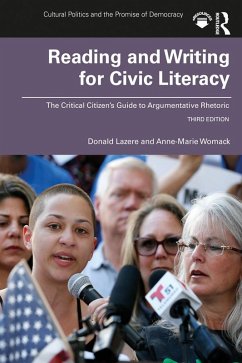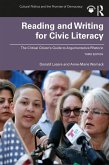Donald Lazere, Anne-Marie Womack
Reading and Writing for Civic Literacy (eBook, PDF)
The Critical Citizen's Guide to Argumentative Rhetoric, Brief Edition
52,95 €
52,95 €
inkl. MwSt.
Sofort per Download lieferbar

26 °P sammeln
52,95 €
Als Download kaufen

52,95 €
inkl. MwSt.
Sofort per Download lieferbar

26 °P sammeln
Jetzt verschenken
Alle Infos zum eBook verschenken
52,95 €
inkl. MwSt.
Sofort per Download lieferbar
Alle Infos zum eBook verschenken

26 °P sammeln
Donald Lazere, Anne-Marie Womack
Reading and Writing for Civic Literacy (eBook, PDF)
The Critical Citizen's Guide to Argumentative Rhetoric, Brief Edition
- Format: PDF
- Merkliste
- Auf die Merkliste
- Bewerten Bewerten
- Teilen
- Produkt teilen
- Produkterinnerung
- Produkterinnerung

Bitte loggen Sie sich zunächst in Ihr Kundenkonto ein oder registrieren Sie sich bei
bücher.de, um das eBook-Abo tolino select nutzen zu können.
Hier können Sie sich einloggen
Hier können Sie sich einloggen
Sie sind bereits eingeloggt. Klicken Sie auf 2. tolino select Abo, um fortzufahren.

Bitte loggen Sie sich zunächst in Ihr Kundenkonto ein oder registrieren Sie sich bei bücher.de, um das eBook-Abo tolino select nutzen zu können.
This edition is updated for a new era of populism, racial tensions, and the most rhetorical presidential campaign in memory - addressing the need for college students to develop critical reading, writing, and thinking skills for self-defense in the contentious arena of American civic rhetoric.
- Geräte: PC
- ohne Kopierschutz
- eBook Hilfe
- Größe: 8.42MB
Andere Kunden interessierten sich auch für
![Reading and Writing for Civic Literacy (eBook, ePUB) Reading and Writing for Civic Literacy (eBook, ePUB)]() Donald LazereReading and Writing for Civic Literacy (eBook, ePUB)52,95 €
Donald LazereReading and Writing for Civic Literacy (eBook, ePUB)52,95 €![The Routledge International Handbook of Research on Writing (eBook, PDF) The Routledge International Handbook of Research on Writing (eBook, PDF)]() The Routledge International Handbook of Research on Writing (eBook, PDF)91,95 €
The Routledge International Handbook of Research on Writing (eBook, PDF)91,95 €![Digital Reading and Writing in Composition Studies (eBook, PDF) Digital Reading and Writing in Composition Studies (eBook, PDF)]() Digital Reading and Writing in Composition Studies (eBook, PDF)43,95 €
Digital Reading and Writing in Composition Studies (eBook, PDF)43,95 €![Multimodal Epistemologies (eBook, PDF) Multimodal Epistemologies (eBook, PDF)]() Multimodal Epistemologies (eBook, PDF)41,95 €
Multimodal Epistemologies (eBook, PDF)41,95 €![Exploring Grammar Through Texts (eBook, PDF) Exploring Grammar Through Texts (eBook, PDF)]() Cornelia ParaskevasExploring Grammar Through Texts (eBook, PDF)37,95 €
Cornelia ParaskevasExploring Grammar Through Texts (eBook, PDF)37,95 €![Writing Using Sources for Academic Purposes (eBook, PDF) Writing Using Sources for Academic Purposes (eBook, PDF)]() Rosemary WetteWriting Using Sources for Academic Purposes (eBook, PDF)39,95 €
Rosemary WetteWriting Using Sources for Academic Purposes (eBook, PDF)39,95 €![Corpus Linguistics for Writing Development (eBook, PDF) Corpus Linguistics for Writing Development (eBook, PDF)]() Philip DurrantCorpus Linguistics for Writing Development (eBook, PDF)37,95 €
Philip DurrantCorpus Linguistics for Writing Development (eBook, PDF)37,95 €-
-
-
This edition is updated for a new era of populism, racial tensions, and the most rhetorical presidential campaign in memory - addressing the need for college students to develop critical reading, writing, and thinking skills for self-defense in the contentious arena of American civic rhetoric.
Dieser Download kann aus rechtlichen Gründen nur mit Rechnungsadresse in A, B, BG, CY, CZ, D, DK, EW, E, FIN, F, GR, HR, H, IRL, I, LT, L, LR, M, NL, PL, P, R, S, SLO, SK ausgeliefert werden.
Produktdetails
- Produktdetails
- Verlag: Taylor & Francis eBooks
- Seitenzahl: 338
- Erscheinungstermin: 7. Oktober 2020
- Englisch
- ISBN-13: 9781351689038
- Artikelnr.: 60026384
- Verlag: Taylor & Francis eBooks
- Seitenzahl: 338
- Erscheinungstermin: 7. Oktober 2020
- Englisch
- ISBN-13: 9781351689038
- Artikelnr.: 60026384
- Herstellerkennzeichnung Die Herstellerinformationen sind derzeit nicht verfügbar.
Donald Lazere is Professor Emeritus of English at Cal Poly State U, San Luis Obispo. He has written or edited six other scholarly and text books on argumentative rhetoric and the politics of education, media, and literature. He has also published widely on these topics in scholarly journals as well as in opinion columns and book reviews for journalistic periodicals such as the Washington Post, New York Times, and Los Angeles Times.
Anne-Marie Womack is a Professor of Practice and former Director of Writing at Tulane University. She's the creator of the award-winning AccessibleSyllabus.com, a guide to universally designing educational documents. Her articles appear in College Composition and Communication, Composition Forum, Pedagogy, and Hybrid Pedagogy, among others. Currently, she is co-authoring a book on inclusive college classrooms with Lauren Cardon.
Anne-Marie Womack is a Professor of Practice and former Director of Writing at Tulane University. She's the creator of the award-winning AccessibleSyllabus.com, a guide to universally designing educational documents. Her articles appear in College Composition and Communication, Composition Forum, Pedagogy, and Hybrid Pedagogy, among others. Currently, she is co-authoring a book on inclusive college classrooms with Lauren Cardon.
Preface to Teachers and Students
Acknowledgments
Part I: Introduction
Chapter 1: An Appeal to Students
Chapter 2: Good Arguments
Chapter 3: Definitions and Criteria of Critical Thinking
Chapter 4: Semantics in Rhetoric and Critical Thinking
Chapter 5: Writing Argumentative Papers
Part II: Attaining an Open Mind: Overcoming Psychological Blocks to Critical Thinking
Chapter 6: From Cocksure Ignorance to Thoughtful Uncertainty: Viewpoint
Bias
and Culturally Conditioned Assumptions
Chapter 7: Overgeneralization
Stereotyping
and Prejudice
Chapter 8: Authoritarianism and Conformity
Rationalization and Compartmentalization
Part III: Elements of Argumentative Rhetoric
Chapter 9: Some Key Terms in Logic and Argumentation
Chapter 10: Fallacies
Chapter 11: Causal Analysis
Chapter 12: Uses and Misuses of Emotional Appeal
Part IV: Thinking Critically about the Rhetoric of Politics and Mass Media
Chapter 13: Thinking Critically about Political Rhetoric
Chapter 14: Thinking Critically about Mass Media
Chapter 15: Deception Detection: Varieties of Special Interests and Propaganda
Chapter 16: From Reaganomics to Trumponomics: Opposing Views on Taxation and the Wealth Gap
Index
Works Cited
Acknowledgments
Part I: Introduction
Chapter 1: An Appeal to Students
Chapter 2: Good Arguments
Chapter 3: Definitions and Criteria of Critical Thinking
Chapter 4: Semantics in Rhetoric and Critical Thinking
Chapter 5: Writing Argumentative Papers
Part II: Attaining an Open Mind: Overcoming Psychological Blocks to Critical Thinking
Chapter 6: From Cocksure Ignorance to Thoughtful Uncertainty: Viewpoint
Bias
and Culturally Conditioned Assumptions
Chapter 7: Overgeneralization
Stereotyping
and Prejudice
Chapter 8: Authoritarianism and Conformity
Rationalization and Compartmentalization
Part III: Elements of Argumentative Rhetoric
Chapter 9: Some Key Terms in Logic and Argumentation
Chapter 10: Fallacies
Chapter 11: Causal Analysis
Chapter 12: Uses and Misuses of Emotional Appeal
Part IV: Thinking Critically about the Rhetoric of Politics and Mass Media
Chapter 13: Thinking Critically about Political Rhetoric
Chapter 14: Thinking Critically about Mass Media
Chapter 15: Deception Detection: Varieties of Special Interests and Propaganda
Chapter 16: From Reaganomics to Trumponomics: Opposing Views on Taxation and the Wealth Gap
Index
Works Cited
Preface to Teachers and Students
Acknowledgments
Part I: Introduction
Chapter 1: An Appeal to Students
Chapter 2: Good Arguments
Chapter 3: Definitions and Criteria of Critical Thinking
Chapter 4: Semantics in Rhetoric and Critical Thinking
Chapter 5: Writing Argumentative Papers
Part II: Attaining an Open Mind: Overcoming Psychological Blocks to Critical Thinking
Chapter 6: From Cocksure Ignorance to Thoughtful Uncertainty: Viewpoint
Bias
and Culturally Conditioned Assumptions
Chapter 7: Overgeneralization
Stereotyping
and Prejudice
Chapter 8: Authoritarianism and Conformity
Rationalization and Compartmentalization
Part III: Elements of Argumentative Rhetoric
Chapter 9: Some Key Terms in Logic and Argumentation
Chapter 10: Fallacies
Chapter 11: Causal Analysis
Chapter 12: Uses and Misuses of Emotional Appeal
Part IV: Thinking Critically about the Rhetoric of Politics and Mass Media
Chapter 13: Thinking Critically about Political Rhetoric
Chapter 14: Thinking Critically about Mass Media
Chapter 15: Deception Detection: Varieties of Special Interests and Propaganda
Chapter 16: From Reaganomics to Trumponomics: Opposing Views on Taxation and the Wealth Gap
Index
Works Cited
Acknowledgments
Part I: Introduction
Chapter 1: An Appeal to Students
Chapter 2: Good Arguments
Chapter 3: Definitions and Criteria of Critical Thinking
Chapter 4: Semantics in Rhetoric and Critical Thinking
Chapter 5: Writing Argumentative Papers
Part II: Attaining an Open Mind: Overcoming Psychological Blocks to Critical Thinking
Chapter 6: From Cocksure Ignorance to Thoughtful Uncertainty: Viewpoint
Bias
and Culturally Conditioned Assumptions
Chapter 7: Overgeneralization
Stereotyping
and Prejudice
Chapter 8: Authoritarianism and Conformity
Rationalization and Compartmentalization
Part III: Elements of Argumentative Rhetoric
Chapter 9: Some Key Terms in Logic and Argumentation
Chapter 10: Fallacies
Chapter 11: Causal Analysis
Chapter 12: Uses and Misuses of Emotional Appeal
Part IV: Thinking Critically about the Rhetoric of Politics and Mass Media
Chapter 13: Thinking Critically about Political Rhetoric
Chapter 14: Thinking Critically about Mass Media
Chapter 15: Deception Detection: Varieties of Special Interests and Propaganda
Chapter 16: From Reaganomics to Trumponomics: Opposing Views on Taxation and the Wealth Gap
Index
Works Cited







